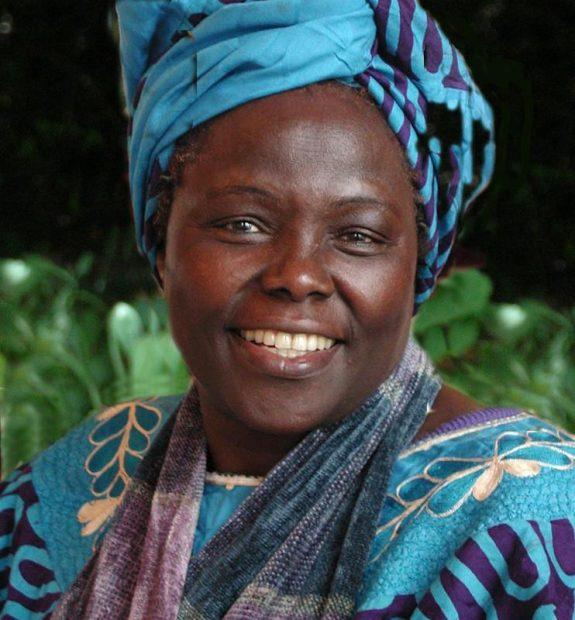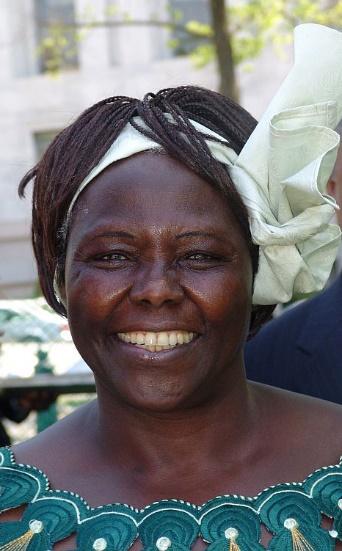Wangarĩ Muta
Wangari Maathai was the first African woman to be awarded the Nobel Peace Prize in 2004, for her contribution to sustainable development, democracy and peace. According to the Nobel Foundation’s biography of her many achievements, she was also the first female scholar from East and Central Africa to earn a doctorate, and the first female professor ever in her home country of Kenya.
She started a campaign to address the destruction caused by deforestation, to encourage women to plant trees in their locale. This became the Green Belt Movement and spread to other African countries, contributing to the planting of over thirty million trees.
Maathai’s vision was not limited to tree planting, she saw it more widely as contributing to democracy and women’s rights. As the Nobel Committee said of her “she thinks globally and acts locally.”
1 April 1940, Nyeri, Kenya
25 September 2011, Nairobi, Kenya of ovarian cancer
She is buried at the Wangari Maathai Institute for Peace and Environmental Studies in Nairobi.
Kenya
Kenyan, Kikuru
1963 – Kenyan independence.
1964 – BSc Biological Sciences from Mount St. Scholastica College in Atchison, Kansas
1966 – MSc from the University of Pittsburgh (1966)
1971 – PhD from the University of Nairobi where she also taught veterinary anatomy
1973 – Became Director of the Kenya Red Cross
1976 – Became Chair of the Department of Veterinary Anatomy at Nairobi
1977 – Becomes an Associate Professor and founds the Green Belt Movement
1981 – 87 Chair of National Council of Women of Kenya
1984 – Awarded the Right Livelihood Award for converting the Kenyan ecological debate into mass action for reforestation
2002 – Elected as an MP to the Parliament of Kenya
2003 – Eounded the Mazingira Green party of Kenya
2003-5 Served as Assistant Minister for Environment and National Resources in President Mwai Kibaki’s government.
Born in 1940, in Ihithe, a small village in colonial Kenya. She went to the village primary school with her brothers, and aged 11 moved to a Catholic boarding school in Nyeri. From there, after coming first in her class, she went to the only Catholic High school for girls in Kenya, Loreto High School in Limuru. Wangari Maathai was one of the beneficiaries of what became known as ‘The Kennedy Airlift’ , an initiative started in 1959 by a 28yearold Kenyan, Tom Mboya, who obtained support for Kenyan students to attend US universities.
After studying in the US, Maathi returned to Kenya and took up a research position at the University of Nairobi in the Department of Veterinary Anatomy. In 1967, encouraged by her professor she spent two years in Germany studying towards her PhD. She returned to Kenya in 1969, got married and continued her PhD research whilst working as an assistant lecturer.
Maathai was active in the National Council of Women of Kenya in 1976-87 and was its Chairman in 1981-87. She also worked with the Kenyan Red Cross, and the Environmental Liaison Centre. In 1976 she came up with the seemingly simple idea of planting trees, but in the subsistence farming communities, deforestation was a significant threat to the food and water supply. As well as boosting the conservation efforts in rural Kenya, the initiative gave training to women in associated skills such as beekeeping and forestry, enabling them to earn a living. After a faltering start, the community based initiative went on to exceed expectations.
In 1986, the movement established a Pan African Green Belt Network to spread the approach. Representatives from other African countries visited Kenya over the next three years to develop their own programmes to combat deforestation, water crises and rural hunger.
With Daniel arap Moi elected as President of Kenya, political problems ensued for Maathai as he tried to limit the influence of those of Kikiyu ethnicity in the country. She campaigned against land grabbing and development of forest land, most notably the plan to urbanise Uhuru Park, and to privatise large areas of public land in the Karura Forest.
Whilst the Kenyan Government ignored the many awards she received and tried to silence her as ‘a crazy woman’ and a ‘divorcee’, she kept on planting trees andprotesting for democracy . She was finally elected to her home Tetu constituency as part of the National Rainbow Coalition with a landslide 98% of the vote.
She was married in 1969 to Mwangi Mathai, another Kenyan who had studied in the US. They separated in 1977 and divorced in 1979.
Sons – Waweru (b. 1970?) Muta (b.1974)
Daughter – Wanjira (b. Dec 1971)
Wangari Maathai – Biographical. NobelPrize.org. Nobel Prize Outreach AB 2022. Tue. 29 Mar 2022. https://www.nobelprize.org/prizes/peace/2004/maathai/biographical/
Wangari Maathai – Nobel Lecture. NobelPrize.org. Nobel Prize Outreach AB 2022. Tue. 29 Mar 2022. https://www.nobelprize.org/prizes/peace/2004/maathai/lecture/
https://www.greenbeltmovement.org/wangari-maathai



